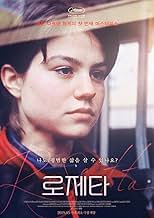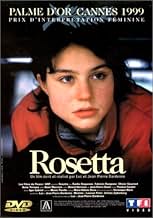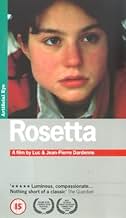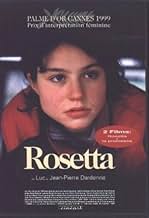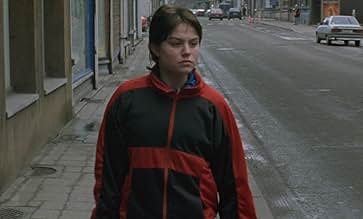IMDb रेटिंग
7.4/10
17 हज़ार
आपकी रेटिंग
जवान और मोजी रोसेटा अपनी शराबी माँ के साथ रहती है और, हताश होकर, वह नौकरी पर बने रहने के लिए कुछ भी करेगी.जवान और मोजी रोसेटा अपनी शराबी माँ के साथ रहती है और, हताश होकर, वह नौकरी पर बने रहने के लिए कुछ भी करेगी.जवान और मोजी रोसेटा अपनी शराबी माँ के साथ रहती है और, हताश होकर, वह नौकरी पर बने रहने के लिए कुछ भी करेगी.
- निर्देशक
- लेखक
- स्टार
- पुरस्कार
- 10 जीत और कुल 7 नामांकन
Leon Michaux
- First Policeman
- (as Léon Michaux)
फ़ीचर्ड समीक्षाएं
This film relies mainly on one camera to capture every little action and detail of the lead character, Rosetta, especially in her reactions to the despair she suffers throughout the film. I caught this one on IFC on May 23rd. The acting is so realistic, it is hard to imagine that the story is fictional and is shot in a documentary type style, where the hand held camera follows the actors, sneaks glimpses of their world in much the same way an ENG crew would on a story about poverty in a small European town where the economy is so bad there is little one can do to survive outside of desperate acts. In this case, Rosetta, the young girl with an alcoholic mother, lives in a trailer with no heat, has to sell re-sewn clothes to make a meager existence until she finally sees an opportunity open up for a job selling waffles at a small stand in a high traffic part of town. A young man who works there is smitten with her and offers to split some earnings from selling waffles he makes outside of his boss's knowledge. To tell you what happens next would give away the rest, but suffice to say this film is bitterly realistic, terribly sad and the ending is rather sudden but it shows some promise for the characters. The movie is shot with almost no budget, but some great camera work, some scenes a little long but edited fairly well, no music, and subtitles under the French dialog. It deserves awards for telling a very credible story demonstrating hardship of the poor in Europe and what measures one has to take to survive. I was deeply moved and driven to weep during painful scenes of the lead character's despair and what seems to be a hopeless situation. The character is genuinely portrayed by a young actress from Belgium performing extremely well for her first film role. Fine work by director and cast.
10MikeF-6
This small Belgian film was the unexpected winner of the Palme d'Or at Cannes during the year when David Cronenberg and his panel of contrarians ruled. Because other, more popular films ("All About My Mother," "L'Humanité," "The Straight Story") were passed over, "Rosetta" has received a reputation as an undeserved winner. I am here to proclaim it a great film and a worthy addition to anyone's Best list. I have not researched whether or not the director of "Rosetta" set out adhere to Dogma 93 principles, but many of them are present no movie makeup, natural light, natural locations, no soundtrack music, and hand held cameras. The camera follows one person the title character so that just about every shot is either of her or from her point of view. Rosetta lives with her alcoholic prostitute mother in a camping trailer at a run down campground called The Grand Canyon. She is in her late teens, doesn't have any friends (except one she meets during the course of the story) or even communicates much with other people, and is only interested in getting a regular job and living a normal life. In a remarkable episode, we see her in bed just before going to sleep. She is having a conversation with herself that goes, "You have a job. I have a job. You have a friend. I have a friend. You have a normal life. I have a normal life. Good night. Good night." Rosetta is played by Émilie Dequenne (who won Best Actress at Cannes). She is so good, so natural, so much *Rosetta* that, along with the photographic technique, she gives the material a documentary feel. One reviewer even called her a "non-actor" as if she were not a professional actress (this is her first movie role) and had been picked right out of that campground to play her own life. The film goes by quickly even as the plot unfolds slowly. We follow Rosetta as she travels her city by foot and bus looking for work, catching fish to eat from an urban river, and tentatively letting one other person into her routines. Sometimes character motivation may seem murky, but it is a thrill, later, when you realize what was really going on. If I remember correctly, there is only one brief dialog exchange near the end where one person explains plot points to another for the audience's benefit. The ending is a tender moment that may indicate a new stage in Rosetta growth. Highly recommended. A beautiful and deeply felt film.
I found this film quite effecting without ever straying into crass sentimentality. Rosetta is a young girl who is full of anger and yearning. She lives with a dysfunctional alcoholic mother in a caravan park. Little is given about her past but we can understand that due to her upbringing she has limited options available to her. Her desire to be find a job (any job) is both desperate and touching. For Rosetta the prospect of a job, even a job that many in middle class society (indeed the average art house cinema goer!) might regard as mundane and without prospects, represents to her a chance to escape the existence on the outskirts of society. Her drive however raises her above the mere status of victim, and it is a credit to the lead that she conveys so much of this, without it having to be spelt out.
One thing I did find a little disconcerting was the wobbly camera technique, don't see if you are feeling a little nauseous as I was however this is only a minor criticism. Its around 90 minutes and I think well worth the investment if you like a good character based movie.
One thing I did find a little disconcerting was the wobbly camera technique, don't see if you are feeling a little nauseous as I was however this is only a minor criticism. Its around 90 minutes and I think well worth the investment if you like a good character based movie.
I saw "Rosetta" several weeks ago - and I still fail to recall any movie which could convey such an immediate sense of being pysically there, all the time along Rosetta's everydays' "war". We are bombarded and flooded with images 16hours per day, it takes great stregth of vision, of images, atmosphere and characters to grab at you this effectively in year 2000! Rosetta struck my as a very real encounter, with all the nonsense and ups / down of real events and life... It made me feel more of life, made me think of it more often and more intensely, it made me look into more eyes than I did before... Thank you, Luc and Jean-Pierre! and thank you, Emilie and all!
Sometimes you see a work of art and it knocks you out - it's all you can do for days and days to come to get it out of your mind. And you try to find a way in your mind to bring yourself closer to it, immerse yourself in it. You'll read everything about it that you can, try to find some more of the artist's work, find everything you can to do with it. All this to try and replicate the feeling that you experienced when you first encountered the piece. This is the effect that I've been trying to achieve since I saw Rosetta at 1999's London Film Festival.
Though some have attributed Rosetta's success at Cannes to the last-day syndrome; whereby the film that stays freshest in the panel's minds is the one that wins, it smacks of cavilling to suggest that this is the reason behind Rosetta's success - the simple fact is that it's a remarkable film which was only seriously rivalled this year by Almodovar's All About My Mother. Ignorance and snobbery have constantly been at work when Rosetta has been considered by critics, since it's a film which has divided the critics.
Top of the list of things-to-hate about Rosetta is the Dardennes' decision to shoot hand-held, an objection which I can understand but barely comprehend. Rosetta is a film which follows its heroine. Therefore, by mounting the camera almost on her shoulders, we see the world as she sees it, just as we see the world as she thinks it throughout the rest of the film. Most perfect is a scene when she is lying in bed at the house of Ricquet, her (only) friend, when she reassures herself that she's normal, she's found a friend, a *true* job and that she won't fall into the hole. Seldom is a more perfect and more touching marriage and explanation of the inner-self and its outer-conflicts achieved? - it's just magnificent cinema.
Rosetta is a fighter, but although her conflicts are with individuals, in a literal, physical sense, the metaphorical struggle is with the societal brick wall which she comes up against when trying to forge 'une vie normale' for herself. She's fighting against society for the right to live a life; she's fighting against society for a modicum of dignity. In this way, Rosetta is both existentialist and political, though never overtly, much to the credit of the Dardenne Brothers, since Rosetta is a 'universal' film.
The question which Rosetta poses is how we can release ourselves from the trouble we are in. Rosetta believes, and has been taught to believe (ironically, by society) that the way that she can achieve this dignity is by getting a 'true' job - so much so that she phones her boss to tell him that she won't be at work before her suicide attempt. She doesn't see that it's through Ricquet, not through having a job (his job) that she stands the best chance of forging a true identity, a true life and true dignity.
Rosetta is, in effect, just a proletarian hero, fighting society for the right to live and the right to work. However, to see the film in this way is reductionist in the extreme and is self-defeating. Rosetta is, above all, an individual. Her victory is to see that she has a friend who was there all along, and this gives us a remarkable ending that is full of drama; packs a considerable emotional punch and is unforgettable, thanks especially to a stunningly naturalistic performance by Emilie Dequenne, who won an award at Cannes for her portrayal of Rosetta. Her interpretation of the eponymous heroine lends so much to the film that she is as much responsible for the brilliance of the film as the directors are.
This film will never be a hit with middle-class and middle-class, middle-brow critics it in the same way that Schindler's List and The English Patient were; the bourgeoisie never want to get their hands dirty. It's their loss; Rosetta is quite simply one of the most wonderful films you'll ever see.
Though some have attributed Rosetta's success at Cannes to the last-day syndrome; whereby the film that stays freshest in the panel's minds is the one that wins, it smacks of cavilling to suggest that this is the reason behind Rosetta's success - the simple fact is that it's a remarkable film which was only seriously rivalled this year by Almodovar's All About My Mother. Ignorance and snobbery have constantly been at work when Rosetta has been considered by critics, since it's a film which has divided the critics.
Top of the list of things-to-hate about Rosetta is the Dardennes' decision to shoot hand-held, an objection which I can understand but barely comprehend. Rosetta is a film which follows its heroine. Therefore, by mounting the camera almost on her shoulders, we see the world as she sees it, just as we see the world as she thinks it throughout the rest of the film. Most perfect is a scene when she is lying in bed at the house of Ricquet, her (only) friend, when she reassures herself that she's normal, she's found a friend, a *true* job and that she won't fall into the hole. Seldom is a more perfect and more touching marriage and explanation of the inner-self and its outer-conflicts achieved? - it's just magnificent cinema.
Rosetta is a fighter, but although her conflicts are with individuals, in a literal, physical sense, the metaphorical struggle is with the societal brick wall which she comes up against when trying to forge 'une vie normale' for herself. She's fighting against society for the right to live a life; she's fighting against society for a modicum of dignity. In this way, Rosetta is both existentialist and political, though never overtly, much to the credit of the Dardenne Brothers, since Rosetta is a 'universal' film.
The question which Rosetta poses is how we can release ourselves from the trouble we are in. Rosetta believes, and has been taught to believe (ironically, by society) that the way that she can achieve this dignity is by getting a 'true' job - so much so that she phones her boss to tell him that she won't be at work before her suicide attempt. She doesn't see that it's through Ricquet, not through having a job (his job) that she stands the best chance of forging a true identity, a true life and true dignity.
Rosetta is, in effect, just a proletarian hero, fighting society for the right to live and the right to work. However, to see the film in this way is reductionist in the extreme and is self-defeating. Rosetta is, above all, an individual. Her victory is to see that she has a friend who was there all along, and this gives us a remarkable ending that is full of drama; packs a considerable emotional punch and is unforgettable, thanks especially to a stunningly naturalistic performance by Emilie Dequenne, who won an award at Cannes for her portrayal of Rosetta. Her interpretation of the eponymous heroine lends so much to the film that she is as much responsible for the brilliance of the film as the directors are.
This film will never be a hit with middle-class and middle-class, middle-brow critics it in the same way that Schindler's List and The English Patient were; the bourgeoisie never want to get their hands dirty. It's their loss; Rosetta is quite simply one of the most wonderful films you'll ever see.
क्या आपको पता है
- ट्रिवियाContrary to popular belief, the film did not inspire a new so-called "Rosetta Law" in Belgium that prohibited employers from paying teen workers less than the minimum wage and included other youth labour reforms. In a Guardian interview with the Dardenne brothers, Jean-Pierre explained the misconception: "No, that law already existed, it just hadn't been voted through yet. The truth is always less interesting than the fiction."
- गूफ़When Rosetta is giving her mother money for a water bill she is wearing a jacket with the sleeves fully extended. However in the next immediate cut when she goes outside the sleeves are rolled up.
- साउंडट्रैकSomething New
टॉप पसंद
रेटिंग देने के लिए साइन-इन करें और वैयक्तिकृत सुझावों के लिए वॉचलिस्ट करें
- How long is Rosetta?Alexa द्वारा संचालित
विवरण
- रिलीज़ की तारीख़
- कंट्री ऑफ़ ओरिजिन
- आधिकारिक साइट
- भाषा
- इस रूप में भी जाना जाता है
- Розетта
- फ़िल्माने की जगहें
- उत्पादन कंपनियां
- IMDbPro पर और कंपनी क्रेडिट देखें
बॉक्स ऑफ़िस
- US और कनाडा में सकल
- $2,66,665
- US और कनाडा में पहले सप्ताह में कुल कमाई
- $20,187
- 7 नव॰ 1999
- दुनिया भर में सकल
- $2,93,092
इस पेज में योगदान दें
किसी बदलाव का सुझाव दें या अनुपलब्ध कॉन्टेंट जोड़ें

![Bande-annonce [OV] देखें](https://m.media-amazon.com/images/M/MV5BOWY4MGMzYTItZjQwOS00MmVhLWE0MDYtMGZmYmFjNTkyYTU2XkEyXkFqcGdeQXRyYW5zY29kZS13b3JrZmxvdw@@._V1_QL75_UX500_CR0)


